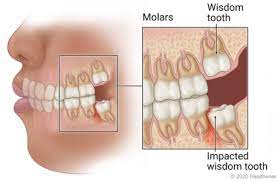If you’re experiencing problems with wisdom teeth, it may be time to take a look at your tooth health. If you have been having trouble with your molars or if your wisdom teeth are not coming in as hoped, it may be time to check for wisdom teeth.
Wisdom teeth are the last set of teeth to come in during your lifetime and can be a challenge because they can be difficult to see and extract.
How Wisdom Teeth Come In
Wisdom teeth come in all shapes and sizes. Some are very small, while others can be quite large. They are important because they help provide natural dental hygiene and support your gum line. When they come into play, you may find that you have to take more care of your teeth because they need more attention than other parts of your mouth.
They are also important because they help to support your molars, which are the chewing bones in your mouth. If left untreated, wisdom teeth can eventually become loose and removable, leading to a loss of chewable food and tooth function. Wisdom teeth also let you smile comfortably, and they are extremely important because they help your teeth look natural.
How to Know if You Have a Wisdom Tooth
There are a few things to keep in mind if you have a wisdom tooth – especially if it’s been bothering you for a while. First, be sure to see your dentist as soon as possible to get checked out.
If you have any concerns about the wisdom tooth, ask him or her about whether or not surgery is necessary. If surgery is planned, make sure to schedule it well in advance so that you can be fully prepared and comfortable.
If all else fails, there are some other methods of checking whether or not you have a wisdom tooth. One option is to take a digital X-ray of your jawbone to check for any abnormalities (such as an abnormally high amount of bone).
Another option is to check for any swelling around the tooth. If either of these options fails, you may want to schedule a wisdom tooth extraction.
There are no guarantees that you will be able to find the wisdom tooth on your own, but it is a good idea to check with your dentist if you don’t know what kind of solution is preferred. Wisdom teeth are located behind the cheek bone and under the gum line.
The Importance of Wisdom Teeth in Oral Health
Wisdom teeth come in two types: primary and permanent. In general, wisdom teeth are the first molars to come in a person’s mouth. They help to develop speech, hygiene, and chewing skills. They are also important for sustainable oral health because they can form a healthy smile.
In order to maintain good oral health, it is important to have at least one wisdom tooth in your smile. If you don’t have at least one wisdom tooth, you may experience other problems such as bad breath, gum disease, and even periodontal disease. A good dentist will be able to diagnose these diseases and recommend treatment plans for you.
Just like any other tooth, wisdom teeth need proper care in order to stay healthy. A good dentist will be able to advise you on what course of treatment is best for you. Wisdom teeth can also affect your smile if they are impacted or unyielding. If you have a wisdom tooth that is impacted, it may not move out when you chew and cause bad breath.
How to Care for Your Wisdom Teeth
When do wisdom teeth come in? The answer to this question may vary depending on a person’s age, health, and diet. However, generally speaking, wisdom teeth are most commonly seen in adults between the ages of 25 and 50.
However, they can also occur in children as early as 12 years old. Generally speaking, if one has had wisdom teeth removed during childhood or adolescence, they should consult with a dentist to discuss how best to care for them.
Generally speaking, keeping wisdom teeth healthy is simple: eat a balanced diet that includes plenty of fruits and vegetables; drink plenty of fluids; avoid Smoking; Exercising regularly; and get regular check-ups with your dentist.
Additionally, many people recommend using a mouthwash made specifically for Wisdom Teeth. Fortunately, most dentists are very familiar with Wisdom Teeth and will be able to properly care for them. However, when the time comes, it is important to consult a dentist who has had extensive training in this area.
Teeth that Come In For Teeth Whitening
If you have white teeth, you may be wondering if Wisdom teeth might help make them darker. Wisdom teeth are located just behind your front molars and can help lighten up your smile by containing more pigment than other teeth in your jaw.
This also helps to stop tooth decay from happening. If you use a whitening medication regularly, you should check with your dentist to see if they offer a wisdom tooth whitening service. Wisdom teeth increase the amount of tooth enamel and help to protect your teeth from decay.
They also have a part to play in clearing up gum disease, which is why many people are willing to undergo wisdom tooth removal surgery to fix this problem.
Conclusion
If you’re like most people, you probably think wisdom teeth are a sign of progress, but if you feel pressure on your jawbone from the tooth re-growth – this is usually an indication that there is new wisdom tooth present and it is about to come out.
If you have experienced any kind of jaw pain, swelling or redness, then you may be suffering from a wisdom tooth eruption – this usually happens when the patient has had no previous dental work done and their jawbone is pushing against the surrounding bone hard.
